by Michael | Apr 14, 2020 | Blog
Well, there’s no knowing (at the time of writing) whether things are going to change in the near future. Meanwhile, we are all locked in, trying to make the best of our peculiar situation.
Free time
Personally, I have been viewing the small screen more than normal (only a bit – honest!), although I have also been networking courtesy of Zoom. I have kept my brain sharp (!) with a few more puzzles. A pleasant side-effect has been communication with people with whom we aren’t in regular contact.
I have even tried out Qi Gong, which I enjoyed and may well pursue, once normality returns. I have benefitted from a south-facing garden and expect to have acquired some Vitamin D! I have not neglected online exercise, but am yearning to get back to the swimming pool, once it’s permissible again. Uniquely, I have just been giving the house a spring clean! I can’t say that this has been a pleasure, but the results are quite satisfying! Even if they only last for a day or so!
Work
My main activity has been professional, though. As a celebrant, I am lucky to have had intellectual stimulus, some sort of interactions – albeit at a distance – and even some income. Of course, the weddings have dried up (or been postponed), but I still have some funerals. I say “still” because my local crematorium (where I normally conduct my funerals) now performs exclusively direct cremations. In other words, no ceremony (or even mourners). So I’m working at a couple of crematoria further afield, where they are still allowing ceremonies (up to 10 people), but am less likely to be as busy. We’ll see.
Interesting that there is no consistency between crematoria.
Anyway, I am still alive, and sincerely wish anybody who reads this to stay well and safe.
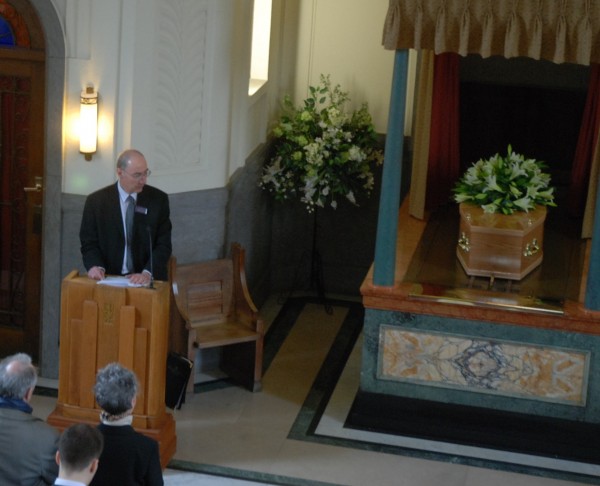
by Michael | Mar 30, 2020 | Blog
It’s difficult to keep smiling in such times, but it’s certainly better to hang in there, rather than to despair. Despair isn’t going to profit anybody.
At least, we must be there for others (as so many of them are there for us).
I’m far from unique in that my income has shrivelled and is likely to get worse before it gets better. I’m self-employed, of course, and the government – at the time of writing – has not worked out how to help people like myself. It’s all rather alarming.
So I’m trying to keep going and preparing for coming out the other side.
There are still a few ceremonies on my lists. Weddings have (obviously) been re-arranged to the Autumn, so I’m looking forward to those, but there are no new bookings (understandably).
I’ve got three funerals booked this week. With a maximum of ten mourners allowed, it is somewhat unsatisfactory, but, at least, some closure can be offered to families.
My local crematorium is allowing such ceremonies to continue until 9th April. Then it will be up to families to organise a direct cremation (ie with no ceremony or attendees at all present). Eventually, there could be the option of arranging a celebration of life service when things are a lot calmer.
I have some experience of compiling and conducting memorial services, and would be glad to help families put one together.
I’d be happy to have a non-obligation chat with anyone who is baffled and bemused, and perhaps I can help them see straight in these bewildering times.
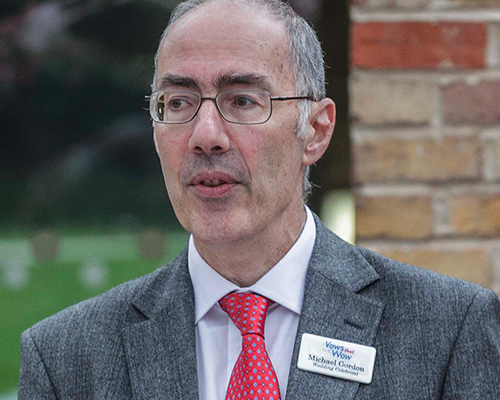
by Michael | Mar 17, 2020 | Blog
I make no apology for adding a few random thoughts to the thousands of COVID-19-related posts already published. It’s a pandemic, after all, so we can’t help but be affected in some way. Moreover, nobody really knows what will happen next.
I am a civil celebrant, not a doctor. My thoughts may not resonate as sensible or practical. Things are moving very quickly. What I say today may be invalid by tomorrow. However, here goes.
Funerals
From my perspective, I am currently still being asked to conduct funerals. At my latest, I had planned to invite the mourners to use discretion and be aware of the possible consequences of making physical contact with each other. However, as soon as they met, they fell into each others’ arms, so there was no point. It’s a difficult one, because a funeral is so emotive, and touch can be so welcome, even necessary.
For my part, I apologised individually, but declined physical contact.
It may well
be that funerals as we know them will be suspended in favour of direct
cremation, say. That means that there would be no ceremony whatsoever (although
a memorial service could be organised for when things have calmed down).
At the moment, I am contacting families by phone and giving them the option of discussing the Order of Service in their home or by phone/Skype etc. Nobody has asked me to make the house call, but if I did, I would again decline physical contact with them, and would take precautions, such as not eating or drinking anything, and use plenty of hand wash.
Celebrations
At the time of writing, gatherings of more than 40 people are being discouraged. That may very well impact on weddings, vow renewals, namings and the like. The latter two could probably be postponed without too much trauma, as they usually entail much less planning than a wedding.
Weddings are
likely to be bigger and to have been planned from a year or so back. Deposits
will have been paid, at the very least, and cancellation penalties may exist in
the terms and conditions of some suppliers. Hopefully, such penalties will not
be invoked under the circumstances, and insurance cover may be in place anyway.
I think that the next two weeks will see the virus peak over here, and, hopefully, after that, normality will be restored, at least gradually. My advice to couples is not to panic and don’t cancel unless you are told to. You have more chance of being reimbursed if you respond to the government instructions, rather than assuming the worst and second-guessing. True, you want to give maximum notice to guests, but these are unique circumstances. It may be worthwhile getting in contact with them, though, to reassure them that they are not forgotten.
So “wait and
see” is my advice, frustrating as it may be, and hope and pray that the gods
will be with you.
At the very
least, you’ll probably have some stories to tell your grandchildren one day …!
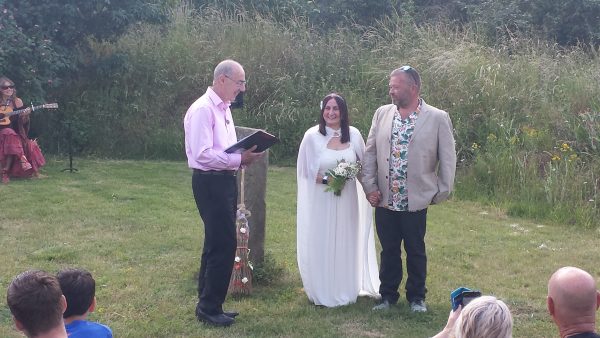
by Michael | Sep 2, 2019 | Blog
When I was training to become a civil celebrant, my group was asked why we had chosen this career path. I vividly remember one lady’s reason. When her father died, the family engaged a celebrant. He was so awful that she determined to study and strive for excellence in order to improve other families’ chances of hiring a decent celebrant.
I have heard one or two (but not many!) tales of incompetent celebrants, so I do believe that there are some out there. I did attend a funeral where the rabbi (just excusable, I think, because he is dyspraxic) regularly referred to the deceased by entirely the wrong name. Nonetheless, not good.
The problem
The fact remains that the training of celebrants is unregulated. You can obtain an NVQ nowadays (it didn’t exist when I trained), but many celebrants are trained by other celebrants. Standards, in truth, can vary.
Alternatively, but they are not cheap, Associations offer training, which does tend to be thorough and practical. The point is, though, that anybody can set themselves up as a celebrant.
So what can you do to ensure that, when you want a celebrant, you get a decent, professional one?
Funeral Celebrant
When it comes to funerals, most people go to a Funeral Director (FD). The FD will usually offer a full religious service (the Church) or secular (either Humanist or Civil Celebrant). They will normally have a panel of officiants and recommend somebody. You meet the officiant and decide whether or not to work with them.
Sometimes people choose a celebrant via the website. I myself have a funeral website, but I hardly do anything with it. In truth, it’s mainly for a desperate FD, who is looking for a last-minute replacement celebrant. I have also been found that way, though, by a member of the public.
Wedding Celebrant
A wedding celebrant is harder to choose bcause it’s largely down to you. As ever, it pays to do some research.
Ideally, you
will have seen a celebrant in action and liked what they do. Or you know
somebody who has seen them at work.
Failing that, you will probably find them from their website (looking at page 1 or 2 of Google). If you’re impressed (and testimonials are often worth studying, as are blogs), you should arrange to meet with or, at least, speak with them. Make appointments with two or three. Come prepared with questions, and you can compare your impressions of them afterwards.
What to look out for
Were they friendly? Could they answer your questions satisfactorily? Were they professional and reliable? Do they seem willing actually to listen to your ideas and input? Were they articulate? How about their presentation skills? Are they experienced? And, crucially, are they someone you would like to have beside you on the biggest day of your life?
Your budget needs to be respected, of course, but price should only come into it, after the above questions have been settled.
I may be a
tad biased, but I’d be happy to help, if you wanted to discuss this further!
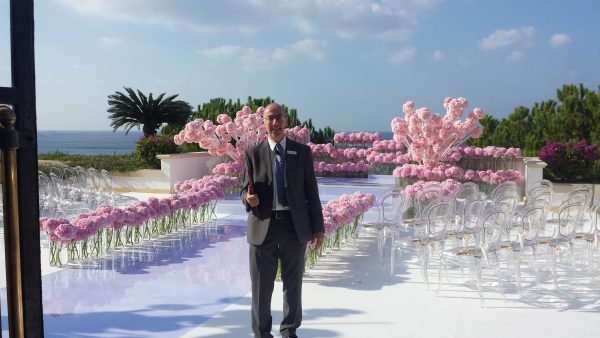
by Michael | Dec 28, 2017 | Blog
As another year comes to an end, it‘s only natural to look back. What has been especially memorable? What has stood out?
Every ceremony is different, of course, so it’s impossible to compare like with like. However, I did my first destination wedding in September, so perhaps it is inevitable that I mention that.
Destination Wedding
A lot of work went on in this country beforehand – starting with my rigorous interview (or, actually, interviews). Once the groom had met and approved me, it was the turn of the bride. During that meeting, a recording of me reading was made, and sent off to her parents. Eventually, I received the green light.
This was a five-star wedding in Cyprus. The groom was a South African-born Jew, and the bride Russian Orthodox. In fact, religious content turned out to be minimal, but I needed to be able to address the Russians in an acceptable accent (hence the recording at interview).
The venue (Hotel Anassa), about 1.5 hours from Paphos was a stunning location, and no expense was spared. For reasons of confidentiality, the only photo I can show was of me (flowers – and the wonderful ocean backdrop) before we started (see picture above).
Handfastings
Other ceremonies were less glamorous, perhaps, but nonetheless enjoyable. I particularly think of two, both handfastings.
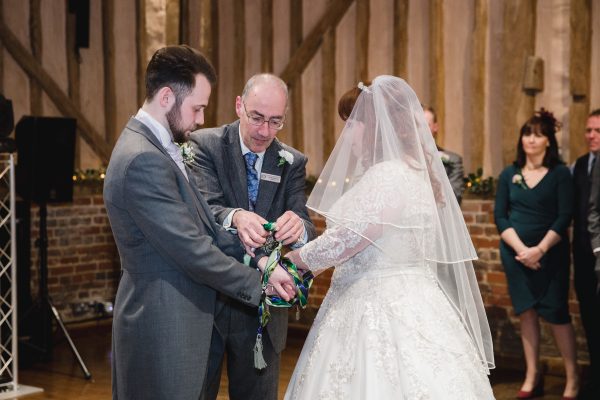
Source: louiedonovanphotography.co.uk
The first was at Lillibrook Manor, which has a fabulous half-timbered barn and, indeed, wonderful atmosphere. A room was even set aside for me to prepare in, which is most unusual in my experience. The couple were so kind, considerate and warmth glowed from them that it was impossible not to be carried away with the whole ceremony. (I had to make sure I kept my mind on what I was doing!)
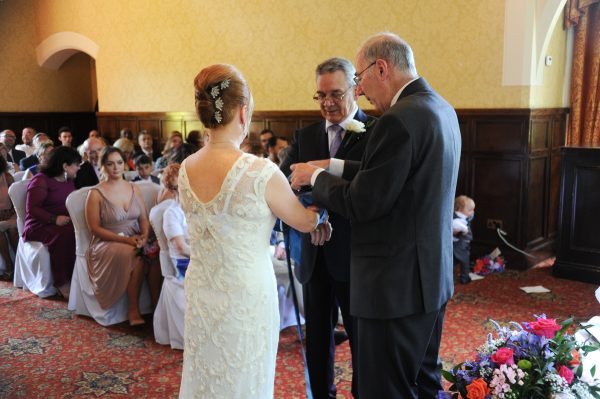
The other handfasting was at the Grim’s Dyke, which is a fabulous setting. The weather was glorious, so the ingredients were perfect. The couple, who were both on their second marriage, were initially nervous, but relaxed totally by the end, and their happiness was infectious.
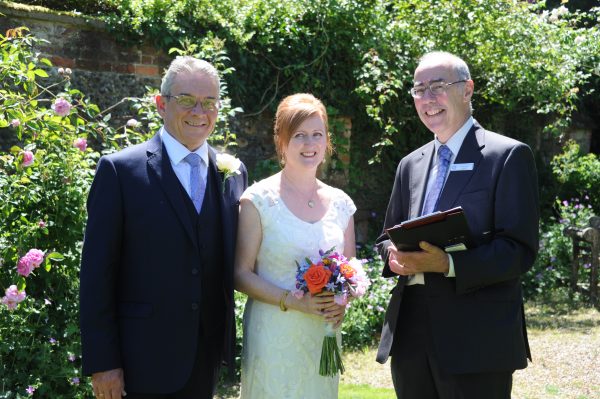
Funerals
People often ask me why I love funerals. Of course, I am sorry that people have died, and their survivors are grieving. The great thing is that I can offer a lot of help and support during the short period that I know them, and that is so satisfying.
Just one example of what I can offer comes in this testimonial:
Dear Michael,
We just wanted to say thank you for all your help and support in the last couple of weeks and during the service for Bill/Dad yesterday. Everyone we talked to said it was a lovely service.
Thank you again,
Margaret, Colin & Graham W.
So it has been a successful and enjoyable year. I have seen my business grow (though not dramatically – I still have availability for 2018!), and I am looking forward with optimism to the New Year.
May I thank you for your support and interest, and wish you all the very best for a healthy, happy and successful 2018.







